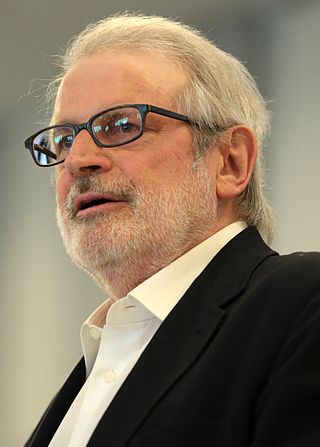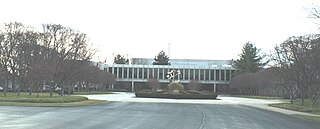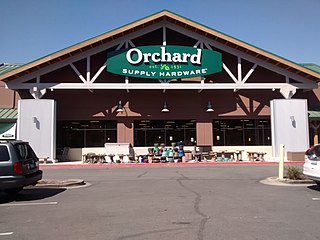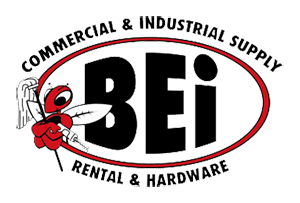Related Research Articles

Rockwell International was a major American manufacturing conglomerate involved in aircraft, the space industry, defense and commercial electronics, components in the automotive industry, printing presses, avionics and industrial products. At its peak, Rockwell International was No. 27 on the Fortune 500 list, with assets of over $8 billion, sales of $27 billion and 115,000 employees.

David Alan Stockman is an American politician and former businessman who was a Republican U.S. Representative from the state of Michigan (1977–1981) and the Director of the Office of Management and Budget (1981–1985) under President Ronald Reagan.

Samsonite International S.A. is a luggage manufacturer and retailer, with products ranging from large suitcases to small toiletries bags and briefcases. The company was founded in Denver, Colorado, United States. Its registered office is in Luxembourg and it is listed on the Hong Kong Stock Exchange.
Ling-Temco-Vought (LTV) was a large American conglomerate which existed from 1961 to 2000. At its peak, it was involved in aerospace, airlines, electronics, steel manufacturing, sporting goods, meat packing, car rentals, and pharmaceuticals, among other businesses.

SEE, legally the Sealed Air Corporation, is a packaging company known for its brands: Cryovac food packaging and Bubble Wrap cushioning packaging. Headquartered in Charlotte, North Carolina, United States, Chief Operating Officer Emile Chammas and Chief Financial Officer Dustin Semach currently serve as interim co-President and co-CEO.

Masco Corporation is an American manufacturer of products for the home improvement and new home construction markets. Comprising more than 20 companies, the Masco conglomerate operates nearly 60 manufacturing facilities in the United States and over 20 in other parts of the world. Since 1969 it trades on the NYSE. Under the leadership of Richard Manoogian, the company grew exponentially and subsequently joined the Fortune 500 list of largest U.S. corporations.
Pay 'n Save was a retail company founded by Monte Lafayette Bean in Seattle, Washington, in 1940. Over the years, Pay 'n Save was the leading drugstore chain in Washington and was the owner of several Washington-based retailers, including Lamonts and Ernst. A 1984 sale of the company to The Trump Group and a 1986 attempt to transform the retailer into a bargain-basement merchandiser resulted in a loss of nearly $50 million. By 1988, Pay 'n Save was sold to Thrifty Corporation, who later sold the stores to PayLess Drug, who retired the Pay 'n Save name. As a result, most of the retailer's divisions were spun off as separate companies or shuttered. As of 2023, Pay 'n Save's membership discount chain, Bi-Mart, is the sole surviving division of the company.
Ernst Home Centers, Inc. was a chain of home improvement retail stores founded in Seattle, Washington, United States. Ernst was started in 1893 by Seattle brothers Charles and Fred Ernst and in 1960 became a division of Pay 'n Save, one of the largest retail companies in the Northwest. After a 1984 takeover of Pay 'n Save, Ernst was sold off and went public in 1994. Following several highly publicized lawsuits and a failed attempt to open larger stores, the company filed for Chapter 11 bankruptcy in 1996 and liquidated in early 1997. At the company's peak, it operated 95 stores in 12 western U.S. states.

W. R. Grace and Co. is an American chemical business based in Columbia, Maryland. It produces specialty chemicals and specialty materials in two divisions: Grace Catalysts Technologies, which makes catalysts and related products and technologies used in petrochemical, refining, and other chemical manufacturing applications, and Grace Materials and Chemicals, which makes specialty materials, including silica-based and silica-alumina-based materials, used in pharmaceutical/consumer, coatings, and chemical process applications.
Collins & Aikman Corporation was an automotive manufacturer of cockpit modules and automotive floor and acoustic systems and a supplier of instrument panels, automotive fabric, plastic based trim and convertible top systems. The Company's operations spanned 15 countries, incorporating about 120 facilities and approximately 25,000 employees. It entered Chapter 11 bankruptcy on May 17, 2005 and went out of business on October 12, 2007.

Gamble-Skogmo Inc. was a conglomerate of retail chains and other businesses that was headquartered in St. Louis Park, Minnesota. Business operated or franchised by Gamble-Skogmo included Gambles hardware and auto supply stores, Woman's World and Mode O'Day clothing stores, J.M. McDonald department stores, Leath Furniture stores, Tempo and Buckeye Mart Discount Stores, Howard's Brandiscount Department Stores, Rasco Variety Stores, Sarco Outlet Stores, Toy World, Rasco-Tempo, Red Owl Grocery, Snyder Drug and the Aldens mail-order company. In Canada, retail operations consisted of Macleods Hardware, based in Winnipeg, Manitoba, and Stedmans Department Stores, based in Toronto, Ontario. Gamble-Skogmo carried a line of home appliances, including radios, televisions, refrigerators, and freezers, under the Coronado brand name.
GraceKennedy Limited is one of the Caribbean's largest conglomerates, with several diversified companies in the Caribbean, Europe and North America.
Garfinckel, Brooks Brothers, Miller & Rhoads, Inc. was a Washington, D.C.-based national retail conglomerate that existed from 1967 to 1981.

Orchard Supply Hardware (OSH) was an American retailer of home improvement and gardening products. Headquartered in San Jose, California, Orchard Supply Hardware had dozens of locations throughout California, with expansions into Oregon and Florida.

Qurate Retail Group is an American media conglomerate controlled by company chairman John C. Malone, who owns a majority of the voting shares.

Builders Emporium was a chain of home improvement stores based in Irvine, California, United States. At the time of its closing in 1993, it had 82 stores in Southern California and an additional 15 in Nevada, New Mexico, Arizona and Texas; 4,300 employees in total.
Aldens was an American catalog merchant company.
Edison Brothers Stores, Inc., was a retail conglomerate based in St. Louis, Missouri. It operated numerous retail chains mainly located in shopping malls, mostly in the fields of shoes, clothing and entertainment, with Bakers Shoes as its flagship chain. The company was liquidated and condemned in 1999, though some of the chains it operated continued under different owners.
Sanford C. Sigoloff was an American businessman and philanthropist. He became known as "Mr. Chapter 11" for his rescuing of a number of companies from bankruptcy, in the course of which he pioneered an investor-friendly "slash-and-burn strategy" at the expense of employees. He supported charitable causes and the UCLA Anderson School of Management, where is the namesake of an endowed chair.
Daylin, Inc. was a major retail conglomerate based in Los Angeles and later Beverly Hills, California. Its best-known unit was Handy Dan Improvement Centers, which prefigured The Home Depot; the company also briefly owned London Drugs as well as Great Eastern, which gave rise to Linens 'n Things.
References
- 1 2 3 4 "Wickes Companies, Inc". Encyclopedia.com. Retrieved October 29, 2023.
- ↑ "MERGER APPROVED; Michigan Bean Co. to Become Division of Wickes Corp". The New York Times. 1955-12-31. ISSN 0362-4331 . Retrieved 2023-07-10.
- ↑ Upi (1981-05-08). "Company News; Wickes to Close Unit". The New York Times. ISSN 0362-4331 . Retrieved 2023-07-10.
- ↑ Brown, Warren (September 23, 1984). "Wickes' Wonder: Largest Chapter 11 Bankruptcy Emerges a Textbook Turnaround". The Washington Post . Retrieved July 9, 2023.
- ↑ "G.&W.-Wickes". The New York Times. September 13, 1985.
- ↑ Talley, Jim (December 11, 1985). "W.R. GRACE TO SELL ITS RETAIL DIVISION" . Sun-Sentinel .
- ↑ "Wickes Buys Grace Units". Chicago Tribune . May 7, 1986.
- ↑ "Wickes to Acquire 2 W.R. Grace Units". New York Times . May 6, 1986.
- ↑ Form 10-K, Wickes, Inc., December 30, 2000
- ↑ "ORDER MAKING FINDINGS AND REVOKING REGISTRATIONS BY DEFAULT AS TO SIX RESPONDENTS" (PDF). U.S. Securities and Exchange Commission. June 8, 2009.
- 1 2 "History of Collins & Aikman". FundingUniverse. Retrieved December 19, 2018.
- ↑ "Collins & Aikman To Close". Associated Press via Manufacturing.net. October 15, 2007. Retrieved October 29, 2023.